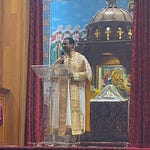This was originally published on May 8, 2023 on Derek Cummins’ A Dose of Theosis Youtube channel. He is a former Protestant Pastor interested in cradle stories and convert journeys to Catholicism and Orthodoxy (Greek and Afroasiatic). He pleasantly surprised me with a particular interest in the Afroasiatic.
For those of you who are new here:
I don’t usually post this frequently, but you are blessed by me being on Spring Break, and having the time to bring you these gems hidden on the internet that I know how to find quickly and redistribute to you here, with my colored commentary.
In Orthodox Prayer Routine I address ‘theosis’ and ‘deification’. TL;DR the goal in life is not to become a Nietzschean übermensch (superman), or platonically metamorphosize into Jonathan Storm, but to become a biblically restored edenic אדם (adam; groundling) of the עפר (3far/afar; dust) of the אדמה (adamah; ground).
These are the verses theosoids wrest unto their own destruction:
Simon Peter, a bondservant and apostle of Jesus Christ, To those who have obtained like precious faith with us by the righteousness of our God and Savior Jesus Christ: Grace and peace be multiplied to you in the knowledge of God and of Jesus our Lord, as His divine power has given to us all things that pertain to life and godliness, through the knowledge of Him who called us by glory and virtue, by which have been given to us exceedingly great and precious promises, that through these you may be partakers of the divine nature, having escaped the corruption that is in the world through lust.
2 Peter 1:1-4 NKJV
the interpretation:
2 Peter builds off of Jude and canonizes Paul. 1-2 need no explanation as we have already encountered them many times before. “Glory and excellence”, I hope this is clear. Again, looking ahead, toward the glory. “partakers of the divine nature”, people make a big deal about that, regarding theosis, but this doesn’t make sense. Remember, the vision of God, blessed are the pure hearts, because they will see God. See means, to be in His presence, facing his countenance, and not His ire. In other words, you go to him, in a situation, beyond the judgement, that you have succeeded. It is like when you say, “I want to make an appointment to see someone.” Meaning, being in his presence. But not His thronal presence of judgement, but His thronal presence of fellowship at the table. And the word here which is partakers is again, friends, κοινωνία (koinonia). A word, in a certain literature, when it has a connotation, you cannot force it in a different direction. In other words, we would be sitting in the divine council, in the divine room.
-Fr. Paul Nadim Tarazi, Orthodox Audio Bible Commentary: The New Testament Audio













Share this post